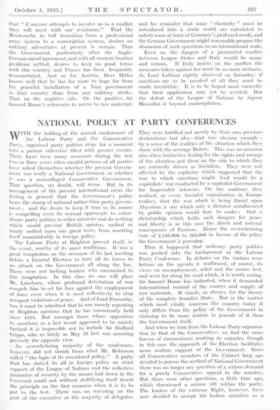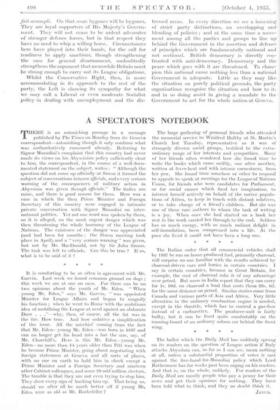NATIONAL POLICY AT PARTY CONFERENCES
• NYITH the holding of the . annual conferences of
the . Labour Party and the Conservative Party, organised party politics steps for a moment Into • a picture otherwise filled with greater events. There have been many occasions during the laSt two or three years when candid persons of all parties have asked themselves whether the present Govern- ment was really a National Government or whether
was. a camouflaged Conservative Government. That question, no doubt, will recur. But in its management of the present international crisis the feeling: • is. general that the Government's policy bears the stamp of national rather than party govern- ment ; . and the desire to keep it true to its course is compelling even its normal opponents to subor- dinate party politics to wider interests and do nothing which would prevent British opinion, unified or nearly unified upon one great' issue, from asserting itself • unmistakably in foreign policy.
The Labour Party at Brighton proved itself, in the event, worthy of its saner traditions. It was a great. temptation on the occasion of its last meeting before, a General Election to turn all its forces to An attack ,. on the Government all along the line, There were not lacking leaders who succumbed to this. temptation. In this class no one will place Mr.. Lansbury, whose profound detestation of war compels. him to set his face against the employment Of force even when it is used.. collectively to stop arrogant violations of .peace. . And of Lord Ponsonby, too, it must be admitted that he was merely repeating at .Brighton opinions . that he has consistently held since , 1,914.. But amongst those whose opposition to sanctions as a last resort appeared to be mainly tactical it „is impossible not to include Sir Stafford (fripps, who as lately as May 22 last was asserting Precisely the opposite view. An overwhelming majority . of the conference, however, did' not shrink from what Mr. Robinson called ".the logic. of. its considered policy." A party that • has staked . its. all in foreign. •policy on strict 81q)port of the League .of. Nations and the collective guarantee of .security by..the means.. laid down in the Covenant, could not without stultifying itself desert the principle • on . the first occasion when. it is . to be put to. the test. There was no,..-wavering on the part -of the executive , or ..the. majority of .delegates,
They were fortified not merely by their own previous declarations but also—that was obvious enough— by a sense of the realities of the situation which they share with the average Briton. This was an occasion also when instinctive feeling for the rights and wrongs of the situation put them on the side to which they are naturally driven as Socialists. They were not affected by the sophistry which suggested that the war to which sanctions might lead would be a capitalists' war conducted by a capitalist Government for Imperialist interests. On the contrary they realised, as every Socialist organisation in Europe realises, that the war which is being thrust upon Abyssinia is one which only a dictator uninfluenced by public opinion would dare to make ; that a dictatorship which holds such dangers for peace and liberty is in this case the direct and natural consequence of Fascism. Hence the overwhelming vote of 2,168,000 to 102,000 in favour of the policy the Government is pursuing.
Thus it happened that ordinary party polities was pushed into the background at the Labour Party Conference. In debates on the various reso- lutions on the agenda it reaffirmed, of course, its views on unemployment, relief and the means test, and went far along the road which, it is worth noting, Sir Samuel Hoare has indicated,• when it demanded international control of the sources and supply of raw materials. It stands, as always, for the theory of the complete Socialist State: But in the Matter which most vitally concerns the country today it only differs from the policy of the Government in claiming to be more zealous in pursuit of it than the Government itself. • And.when we turn from the Labour Party organisa- tion to that of the Conservatives we find the same leaven of circumstance working its miracles, though in this ease the approach of the Election facilitates More zealous support of the Government. Since' all Conservative members of the Cabinet long ago decided to pursue the method of National Government there was no longer any question of a serious demand for a purely Conservative appeal to the country. But there were other questions, a little time age, which threatened a serious rift within the party. The leaders of the extreme Right, however, have now . decided to accept the Indian situation as a fait accompli. On that score bygones will be bygones. They are loyal supporters of His Majesty's Govern- ment. They will not cease to be ardent advocates of stronger defence forces, but in that respect they have no need to whip a willing horse. Circumstances here have played into their hands, for the call for readiness to apply sanctions, though strengthening the ease for general disarmament, undoubtedly strengthens the argument that meanwhile Britain must be strong enough to carry out its League obligations.
Whilst the Conservative Bight, then, is more accommodating in its approach to the rest of the party, the Left is showing its sympathy for what we may call a Liberal or even moderate Socialist policy in dealing with unemployment and the dis- tressed areas. In every direction we see a loosening of strict party distinctions, an overlapping and blending of policies ; and at the same time a move- ment among all the parties and groups to line up behind the Government in the assertion and defence of principles which are fundamentally 'national and not sectional. British democracy is directly con- fronted with anti-democracy. Democracy and the peace which goes with it are threatened. To cham- pion this national cause nothing less than a national Government is adequate. Little as they may like the situation 'on purely political grounds, the party organisations recognise the situation and bow to it, and in so doing assist in giving a mandate to the Government to act for the whole nation at Geneva.











































 Previous page
Previous page